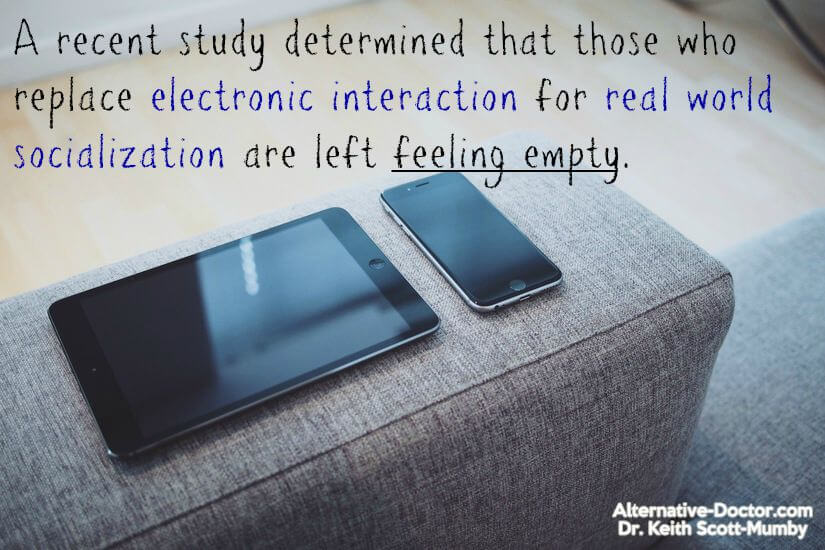When you think about how to prevent depression from taking up residence in your life, you probably don’t give your cell phone much thought. After all, it’s how you stay “connected” so that must be a good thing, right?
Any day of the week, you’ll probably see dozens of people walking down the street staring at the phone in their hand. You see drivers obsessively checking at lights and often in the midst of moving traffic. Consumers in line at the grocery store pass the few moments endlessly scrolling.
Sitting in a restaurant, a place that used to be a social activity in itself, you can glance around to see many individuals intently staring at their glowing screens to catch up with virtual friends rather than focusing on the friends who are sitting across from them!
For the majority of cell phone owners, it is the first thing you check when you open your eyes and the last thing you check before you (attempt to) go to sleep.
I’m Not a “Grouchy Old Man”
I was born before technology established such a firm hold on society. Don’t think I’m ranting because I’m grouchy or annoyed with electronics. I have a smart phone myself and I consider myself tech savvy with the devices that populate our modern world.
However, as a human being and a doctor, I’m concerned. There are legitimate health problems connected to cell phone use.
Excessive use of a cell phone linked to…
- Lower sperm count (Cleveland Clinic).
- Disrupted fetal development (Environmental Health Trust).
- Behavioral issues in children (Danish National Birth Cohort).
- Deteriorated brain cognition while driving (Carnegie Mellon University).
- Permanent hearing loss (U.S. Centers for Disease Control and Prevention).
- Transportation of horrific germs (University of Arizona).
- Long-term damage to your eyes (Charotar University of Science and Technology).
- Sensations of “phantom” vibration (New York University School of Medicine).
- Repetitive stress injuries (American Physical Therapy Association).
Then there is the emotional aspect of excessive cell phone dependence. The social isolation enabled by technology is trending with higher depression statistics. Understanding how to prevent depression includes seeing cycles or habits you may have in your daily life.
Cell Phones Don’t Cure Loneliness
In a recent study released by the Michigan State University, researchers determined that those who replace electronic interaction for real world socialization are left feeling empty.
MSU’s College of Communication Arts and Sciences team found that participants who relied heavily on their cell phones to feel connected to others ultimately realize that the phone is a poor substitute. Problematic use of mobile phones (PUMP) is a rising problem for those who are sinking into feelings of sadness, isolation, or hopelessness.
As it turns out, it worsens a problem that is better addressed with real human contact.

“The research bears out that despite all the advances we’ve made, there is still a place for meaningful, face-to-face interaction. [The mobile phone] seduces us into believing it’s real, but the fact remains it’s still synthetic,” explained team member Prabu David in the journal Computers in Human Behavior. He stresses, “If you have a chance to see someone face-to-face, take it. Life is short.”
Other bizarre and disturbing emotional side effects of cell phone use include less interaction within families, harsher disciplinary action than warranted due to parental frustration for being pulled away from the phone, inability to disconnect even while sleeping, and legitimate phobias among more than half the mobile phone population about being separated from their phone for any length of time.
In the Journal of Behavioral Addictions, Baylor University gave the following conclusion in their research about cell phone addiction, “The cell phone allows us the freedom to gather information, communicate, and socialize in ways only dreamed of…however, cell phones can lead to dependence. It is incumbent upon researchers to identify the all-important “tipping point” where cell phone use crosses the line from a helpful tool to one that enslaves both users and society alike.”
How to Prevent Depression Naturally in 10 Steps
- Plenty of quality sleep (that means turning off your cell phone).
- Interaction with others in social situations (face to face).
- Eat good food and get rid of the refined sugars and flours. Make sure you have healthy fats in your diet! Your brain depends on it!
- Regular exercise every day (disconnect here as well).
- Focus on your now with meditation and plans for your future (phone off).
- Join activities you used to love or have always been interested in (no cell phone during).
- Quit smoking – the toxins make depression worse. Lower alcohol intake until mood improves. Alcohol is a depressant.
- Get regular exposure to sunshine or supplement with vitamin D.
- Keep your schedule within reason. Do not overwhelm yourself!
- Please ask for help if you need it.
Depression doesn’t have to win. If you’re hurting, talk to someone right now and take steps to regain control of your life, mind, and spirit.
Put down your phone and go outside. Breathe deeply and turn your face to the sun. Smile even if you don’t feel like smiling. Let warm, positive thoughts drift through you.
Take ten minutes for your mental well-being right now.
The post Could Your Smart Phone Aggravate Depression? appeared first on Dr. Keith Scott-Mumby.
